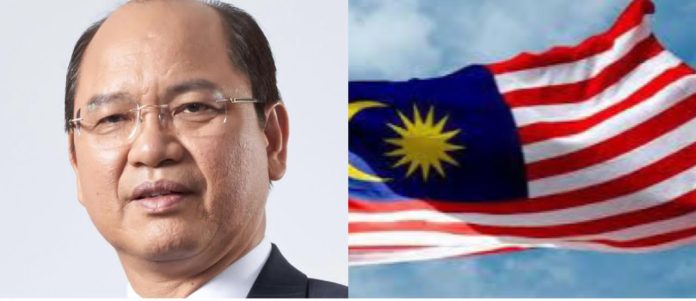By Member of Parliament for Tuaran/Honorary President of UPKO Datuk Seri Wilfred Madius Tangau
KOTA KINABALU: As Malaya celebrates Merdeka Day and Sabah celebrates Sabah Day on August 31, both after Sarawak celebrated Sarawak Day on July 22, and before all of us celebrate Malaysia Day on September 16, I would like to make a plea of unity to fight global crises in economy and environment, not other Malaysians.
I appeal to the wisdom, compassion and magnanimity of Prime Minister Datuk Seri Anwar Ibrahim, Parliamentary Opposition Leader Datuk Seri Hamzah Zainuddin, my fellow parliamentarians, as well as state leaders across all coalition parties to put aside partisan differences to prepare ourselves for the crises which are already here.
Fellow Malaysians, as destructive and distressful as they are, crises also call out the best in us as a nation!
But, how did we lose our peace after GE15 despite the formation of a broad based government with a two-third majority?
Have we Malaysians lost our humility as humans to realise that our crises are not over, but possibly just taking a break? Are we fighting endlessly now because we think we are safe and sound, and we can afford to fight each other again instead of supporting each other?
I am afraid no.
Our political feud is therefore a reminder of our complacency. Because crises seem to have taken a break, we return to arrogance and aggression.
If Malaysians could be mobilised into a crisis management mode, we would be kinder and gentler to each other, and safer and stronger together. After all, unity is hollow without some common threats.
Datuk Seri Anwar Ibrahim offers us the great vision of Madani Economy that excites us with a sunny future 10 years from now. However, humans are sometimes driven more than by fear than hope. Across all backgrounds, Malaysians’ obsession with all sorts of conspiracy theories underlines our craving to feel insecure.
I humbly propose Datuk Seri Anwar Ibrahim to repackage his Madani vision into an immediate alarm for Malaysians to get ready for the upcoming storms. Instead of pandering to the right and dividing the nation on ethno-religious lines, he should instead unite Malaysians with crises that would be cruel to us all.
I also sincerely appeal to Datuk Seri Hamzah Zainuddin and 73 other colleagues on the Opposition bench, and four PN state governments to support and contribute to the realisation of Madani Economy. Whichever parties form the government four years from now, they will inherit a safer, stronger and cleaner Malaysia.
For Malaysians to be consumed by a national mobilisation against environmental disasters and forthcoming economic storms, the Unity Government may want to consider three principles.
Principle 1: If no consensus, keep status quo
Firstly, keep the status quo on matters involving ethnicity, religion, language and regions/states, if there is no broad-based consensus. Given our deep ethno-religiou-regional divide, hasty changes will only divide us and weaken us as a nation. Why wake up the sleeping dog?
Both sides’ commitment is clear in defending the ‘four key elements’ of our Federal Constitution: Islam (Article 3), Malay language (Article 152), Special Status for Malays and Natives of Sabah and Sarawak (Article 153) and Malay Rulers (Article 181).
However, the Federal Constitution – authored in 1957 and modified in 1963 – comes as a package. Let’s not forget about the corresponding articles: Article 8 (equality), Article 10 (freedom of speech, assembly and association), Article 11 (freedom in religion), Article 12 (right in respect of education), Part VI (Relations between the Federation and the States) and Part XIIA (Additional Protections for States of Sabah and Sarawak).
Politically, it would be dangerous for the Unity Government to enter an out-Islamisation race with PN, which it will not win. If it will only endanger itself if it alienates enough Sabahans and Sarawakians to question the viability of Malaysia and enough Chinese and Indian Malayans to stay home in the upcoming by-elections and subsequent state and federal elections.
Principle 2: Treat everyone as stakeholder
Secondly, treat everyone as stakeholder when contemplating any change on sensitive matters. Let’s be sober and honest that in Malaysia, intentional or not, what happens to one community often has spilled-over effect on the other.
If teaching Al-Nawawi’s 40 Hadiths can stem extremism amongst Muslim students, non-Muslims will benefit from better ethno-religious relations, why was it so hard for Prime Minister or Minister of Education to at least informally communicate with non-Muslim community leaders?
And if Hadith No 8 “I have been ordered to fight against people until they testify that there is no god but Allah and that Muhammed is the messenger of Allah, and until they perform the prayers and pay the zakat, and if they do so they will gained protection from me for their lives and property, unless [they do acts that are punishable] in accordance with Islam, and their reckoning will be with Allah the Almighty” (as per the translation in IIUM website https://www.iium.edu.my/deed/hadith/other/hadithnawawi.html) raise worries of non-Muslims, should not their worries be sincerely addressed and alleviated, instead of being told that this is not their business.
I therefore support the call by ABIM to revitalise the Jawatankuasa Keharmornian Antara Penganut Agama (HARMONI) under the Ministry of National Unity. However, I would go one step to urge Datuk Seri Anwar Ibrahim considering a Cabinet committee chaired by himself, advised by a consultative council of community leaders, on ethnic, religious, cultural and linguistic matters.
Often, it is not what to be done, but how they are to be done, that triggers fear and anxiety.
Principle 3: Involve the Opposition in Crisis Management
Thirdly, involve the Opposition leaders in crisis management. In crises, no one could have the perfect solutions. Often, the best solutions are not popular or not immediately effective, as vaccination during the Covid-19 pandemic was. A broad-based decision-making means both merits and responsibilities are shared. Naturally, the Opposition leaders would have to play a positive role or be punished by public opinion.
As per the MOU, former Prime Minister Datuk Seri Ismail Sabri appointed equal numbers of government and PH leaders to the National Recovery Council. This should be emulated in any crisis management structures set up.
I humbly hope my sincere view reaches the Prime Minister and he would respond positively in his National Day Address.


